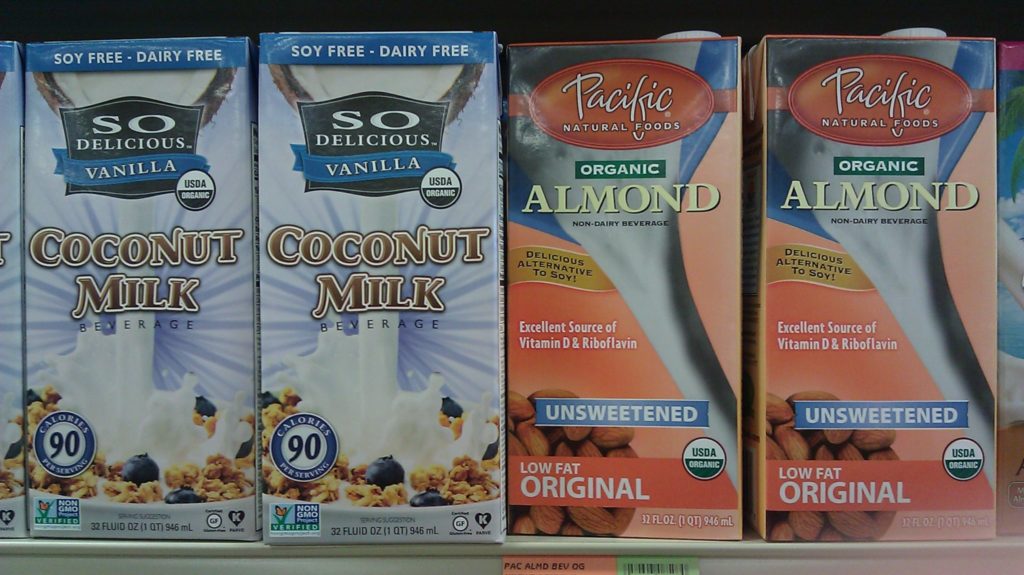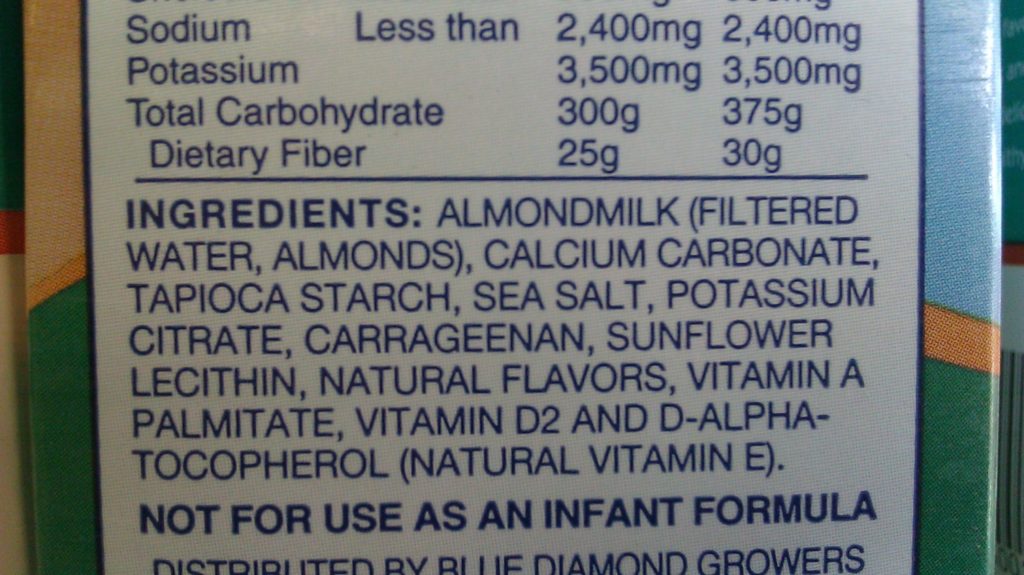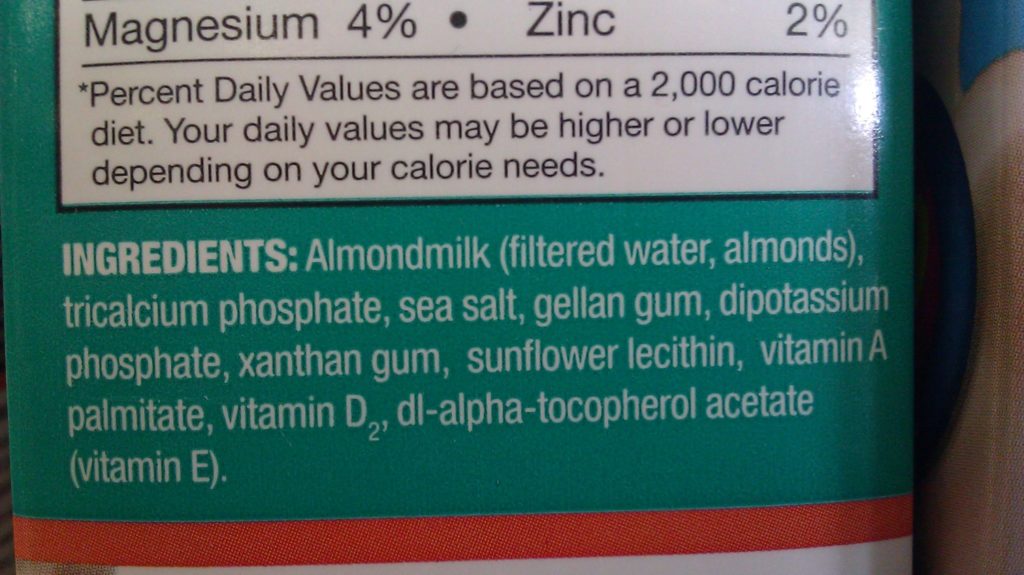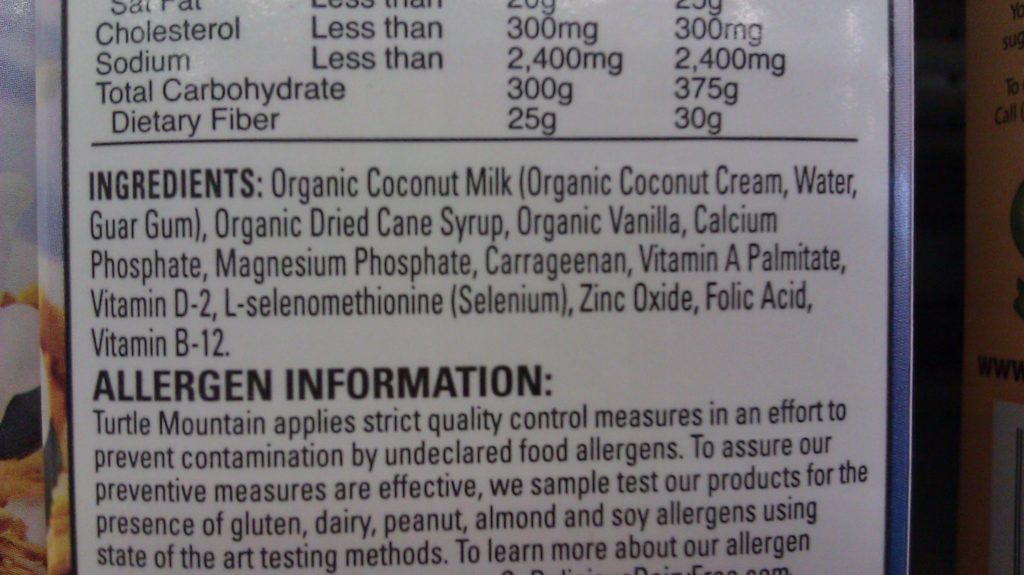 Organic coconut milk and almond milk are common purchases at the health food store by those with dairy allergies. Usually, these people are savvy consumers who know enough nutritionally to avoid soy milk with its endocrine disrupting isoflavones and gastric inflaming phytates. Rice milk is also steadily declining in popularity as it is really not much more than a glass of sugar water nutritionally speaking.
Organic coconut milk and almond milk are common purchases at the health food store by those with dairy allergies. Usually, these people are savvy consumers who know enough nutritionally to avoid soy milk with its endocrine disrupting isoflavones and gastric inflaming phytates. Rice milk is also steadily declining in popularity as it is really not much more than a glass of sugar water nutritionally speaking.
Organic, unsweetened coconut milk and almond milk in cartons seem like great alternatives at first blush, but are they really as “healthy” as people believe?
Let’s take a look at the labels. I was shocked at what I found.
Check out the labels of the three brands I photographed. I checked all the brands, by the way, and they all contained the same dangerous additives I’m about to describe.

First, Vitamin A Palmitate is added, the synthetic version of Vitamin A. I personally avoid synthetic versions of Vitamin A like the plague. Every single multi-vitamin I’ve ever examined contains some form of synthetic A, including the so called “whole foods” multis.
Synthetic vitamins are the chemical mirror images of the real, natural versions. They can cause imbalances over time. Even small amounts of the synthetic fat soluble vitamins like Vitamin A can prove toxic and should be strictly avoided!
The Organic Consumers Association warns that isolated vitamins such as those produced synthetically cannot be recognized or metabolized by the body in the same way as the natural version.

Large doses of natural vitamin A are well tolerated by the body as established by researchers decades ago, however. Traditional diets contain 10 times or more of the RDA of this nutrient with no ill effect. However, synthetic vitamin A is associated with birth defects and bone fractures. It has no benefit in the diet whatsoever.

The second really bad additive in these organic cartons of coconut milk and almond milk is Vitamin D2. Vitamin D2 is a form of the wonder vitamin that you should take great pains to avoid.
In all known cases of Vitamin D toxicity where the dose was intentional, Vitamin D2 was the culprit. By comparison, Vitamin D3 is much less toxic and requires an enormous or even an accidental dose to produce any toxic effect.
Vitamin D2 is manufactured industrially by irradiating yeast. It is dangerous for D2 to be added to any food product particularly if this product would be given to children, where toxicity symptoms would appear at much lower dosages.
None of the store brands of cartoned coconut milk or almond milk were free of these dangerous and synthetic versions of the fat soluble vitamins!
Notice also that carrageenan is present in 2 of the 3 products as well! Dr. Andrew Weil has been telling people to avoid carrageenan since 2002.
Carrageenan is so toxic and inflaming to the human digestive system that this food additive is formally classified by the International Agency for Research on Cancer (part of the World Health Organization) as a potential human carcinogen.
In my view, it would be a mistake to purchase and consume these items. They are in no way health promoting or beneficial, particularly for growing children!
Healthy Alternatives to Coconut Milk and Almond Milk in Cartons
Coconut milk and almond milk should be healthy and they can be if they are produced at home without these dangerous additives. I wrote an in depth post on how to easily make these nondairy beverages yourself. This recipe for wild rice milk is a good option as well.
Believe it or not, even organic coconut milk in BPA free cans would be a better alternative to cartons of coconut milk based on my label inspection!
Check out my video on homemade coconut milk and my article on how to make healthy DIY almond milk, fermented to add probiotics and enzymes to boost immunity and improve digestion.
Sarah, The Healthy Home Economist
Sources
From Seafood to Sunshine: A New Understanding of Vitamin D Safety








I have a question. I’m in Australia, so these brands are not familiar to me, but over here we have almond, rice, soy in tetra-pak cartoons that are on the self, and ones that are in milk carton styles that are in the fridge. It’s my understanding that those found on the shelf are ultra-heat treated and therefore have no nutrients in them, so really not that good for you. Am I right in assuming this? And out of curiosity are the ones in the photo on the shelf or in the fridge? Thanx Evie.
good question!
I buy Ayam coconut milk in cans, and according to the ingredients it’s only coconut milk with some water (82% coconut I believe). It’s not as good as fresh coconut milk, I guess, but doesn’t seem to have added nasties.
Just as a side note, we have had canned organic coconut milk tested, and it still contains small amounts of aluminum from the cans they are packaged in. So, getting the milk in an aluminum can is probably not a healthy alternative. Also, there is a company called “Wilderness Family Naturals” that sells a good healthy coconut milk and cream that does not contain anything other than xanthum gum and coconut milk. Here’s a link: http://www.wildernessfamilynaturals.com/product/coconut-products-coconut-milk/CC250.php
Thanks for the great informative articles and for being brave enough to get the truth out to people, regardless of the controversy and negativity some people bring to the table.
As always you do a great job of uncovering what most of us overlook! It is like all foods – you just have to really watch not only the ingredients but the quality of those ingredients!! As always, best to just make your own. I am a big proponent of coconut products, coconut milk included! I will certainly share the information you presented to family, friends and people following my blog as this is very useful information.
Absolutely right, Sarah!
I believe that Garden of Life vitamins are 100% from real food with no additives. That’s what I’m going to take when my current brand is all gone.
Coconut and Almond Milk in Cartons Not a Healthy Buy – The Healthy Home Economist
http://t.co/0LDtMIzA
#coconut & #almond #milk not #healthy http://t.co/tttSkm0D
@GFreeDietitian the additives in these bevs amaze me, when I have time I make my own…but as a busy girl it’s tough! http://t.co/isF8JIQT
I do not know about synthetic vitamins however my feeling would be that synthetic vitamin A is not the exact chemical opposite (known to chemists as an enatiomer), but rather its both the exact chemical opposite or the mirror image and the correct natural state vitamin. The reason being in a lab its very hard to separate a natural product and its opposite. The only physical lab difference it has is the way it rotates polarized light. It is not impossible but a lot more difficult. Many years ago there was a drug called thalidomide that caused birth defects it turned out that it was a mixture of the 2 chemicals that were mirror images. Only one of the chemicals caused the birth defects the other was a benefit.